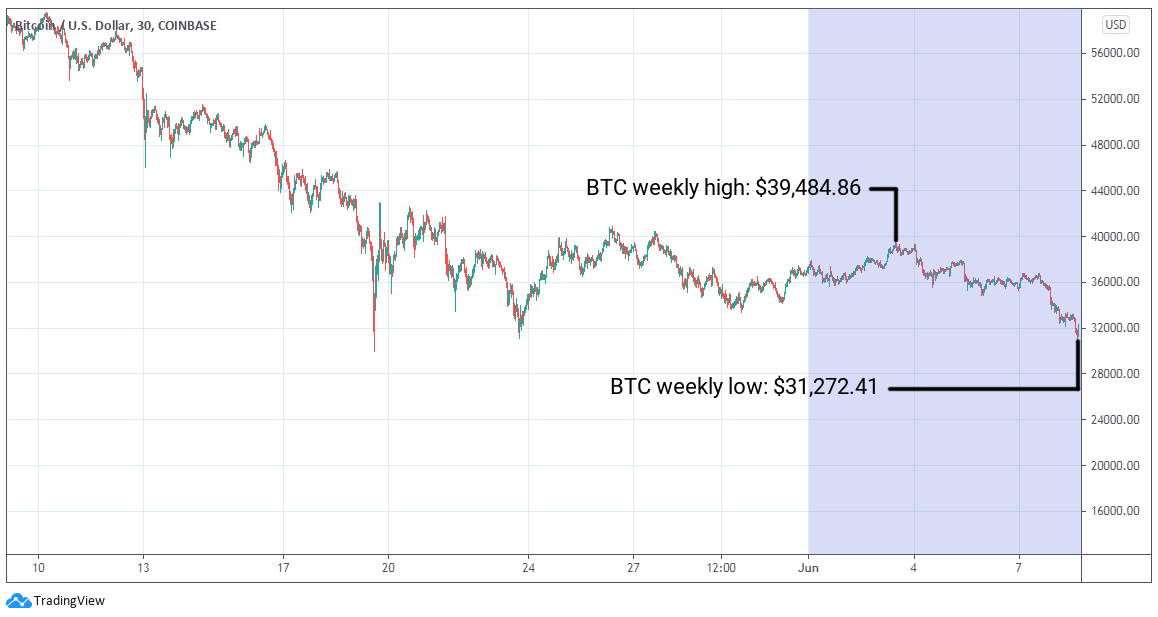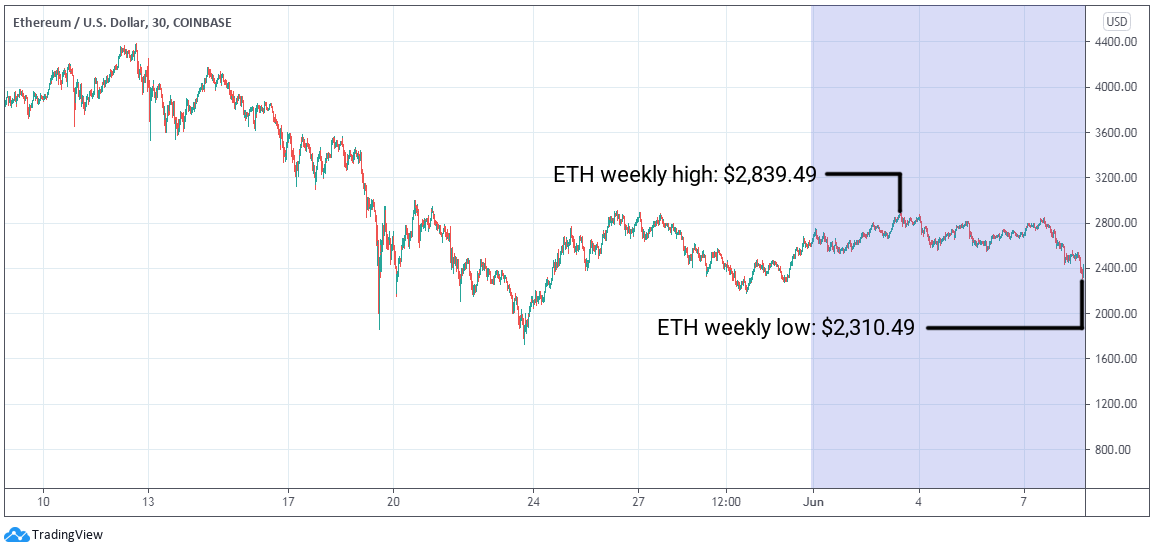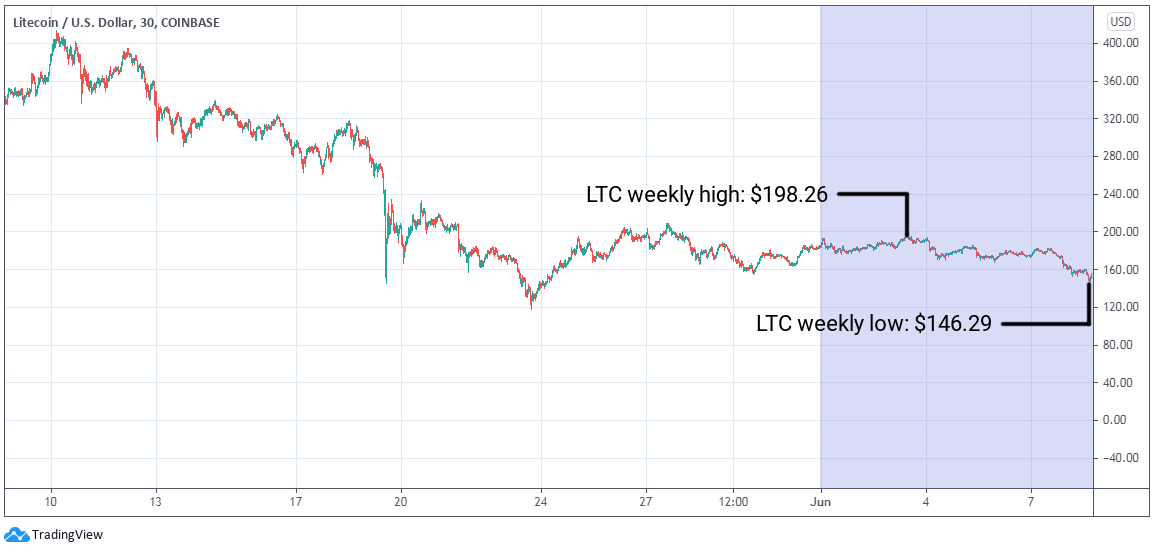ETC Group Crypto Minutes Week #23
Markets seemed uncertain as to whether Bitcoin remained in a bullish or bearish state this week, while Ethereum fared a little better than its number one rival
Markets seemed uncertain as to whether Bitcoin remained in a bullish or bearish state this week, while Ethereum fared a little better than its number one rival

While crypto markets largely moved sideways this week, there was much more excitement around the adoption, regulation and policy coming to the fore.
As US states jostle for access to crypto companies, Texas Governor Greg Abbott signed the much-awaited House Bill 4474 into law, creating a formal legal framework for crypto investments, adapting commercial law to include blockchain and digital assets, and defining virtual currencies. According to the National Law Review, as reported by Coinbase, 25 states are now considering blockchain or crypto-related measures in their 2021 legislative sessions.
One major sign that the mostly Ethereum-based DeFi sector is entering the mainstream comes in a new regulatory whitepaper from The World Economic Forum (WEF) this week.
This once-niche market subset of decentralised, automated financial products like lending, token/currency swaps and borrowing -- using Ethereum as a base layer -- has exploded in popularity, seeing surging capital inflows and total value locked in smart contracts of more than $80bn by late May 2021.
Clearer regulation would give DeFi (mostly focused on crypto-to-crypto and synthetic assets) the ability to interact more seamlessly with mainstream financial products.
The WEF's policy toolkit for governments could hasten this much-needed move.
The Interest in crypto and DeFi rose sharply during the pandemic and investment has accelerated. While DeFi has the potential to transform the financial system, it lacks a clear policy landscape that could help accelerate benefits and mitigate risks. To help policymakers make sense of these trends and craft appropriate guidance the Forum, alongside a community of international organisations and financial institutions created a framework to evaluate DeFi World Economic Forum, policy toolkit, 8 June 2021
In the past 12 months, the value of digital assets locked in DeFi smart contracts surged over 50x, according to industry data aggregator DeFiPulse. The WEF whitepaper also highlights that in the period from June 2020 to June 2021, the number of DeFi-related applications grew 2,400% from eight to more than 200, while the number of user wallets increased over 10x from 100,000 to over 1.2 million.
Decentralised finance platforms like Aave, Compound and MakerDAO are enabling simple, direct access to common financial services through smart contracts, largely created on Ethereum.
And taxonomy is normally first point of contention for global regulators: as we have seen with cryptoassets more broadly over the last 10 years, every project in the space was generally lumped together as disruptive pseudo-currency, no matter whether it was a security token, utility token, stablecoin, store of value or expansive application of distributed ledger-based technology.
DeFi presents a generational expansion of financial opportunity (and always accompanying risk). This report helpfully provides us with a thoughtful, clear and comprehensive cartography of DeFi so that we can make the most of truly innovative opportunities for financial expansion and novel risk mitigation Michael Mosier, Acting Director, US Financial Crimes Enforcement Network
Fundamentally, DeFi opens up access to lending and borrowing to the millions of people who either don't have traditional bank accounts or are otherwise excluded from the global financial system.
It's just about policymakers taking that understanding of what's new and unique about DeFi and thinking through how to weigh some of those trade-offs and not necessarily shut it down just because it's something they're not familiar with. Sumedha Deshmukh, WEF curator of blockchain and digital assets
Financial inclusion for the world's poorest was also the theme of more bombshell news this week, as the President of El Salvador announced he would make Bitcoin legal tender.
Data from the World Bank shows that El Salvador is the 6th-highest ranked country for inbound remittance from the US, making up 21% of the nation's GDP. Remittances back to Low to Middle Income Countries hit a record high of $554bn in 2019, overtaking the rate of Foreign Direct Investments, a crucial form of private investment in domestic companies from overseas.
70% of citizens have no access to a traditional bank account, leaving them at the mercy of intermediaries who charge fees on average of 6.38% of the amount sent, a hugely costly fee for small, regular amounts of money.
The World Bank's latest report on remittance flows, released on 12 May 2021, explains that despite the popularity of remittances, and the growing market size, "in many smaller remittance corridors, costs continue to be exorbitant".
President Nayib Bukele said there would be zero capital gains tax for Bitcoin, as it would be a legal currency under law. In the days following the 5 June news, lawmakers from Panama and Paraguay both revealed proposals to make cryptocurrency part of their formal monetary policy.
This is important and Panama cannot be left behind. If we want to be a true technology and entrepreneurship hub, we have to support cryptocurrencies. We will be preparing a proposal to present at the Assembly. Gabriel Silva, Congressman, National Assembly of Panama
Paraguayan deputy Carlos Rejala too defended the potential adoption of bitcoin and cryptocurrencies, adding that his country could benefit from a formal adoption of digital assets, not just from sending remittances but improving inbound investments. According to Rejala, Paraguayan GDP could increase to double digits if Bitcoin-related companies started investing in the country. Endorsements from Argentinian and Brazilian politicians soon followed, with congressmen across the politican spectrum supporting the El Salvadorian position.
In the same week that ETC Group listed the first ever crypto ETP in the UK, institutions continued their quest for greater allocation to Bitcoin, Ethereum, Litecoin and other digital assets. On the Aquis Exchange, security and liquidity for ETC Group's products is assured by central counterparty clearing, provided by SIX x-clear.
And parsing a new swathe of SEC filings we can see that institutional investors show no sign of backing away from cryptoassets. If anything, more are seeking multi-year access to this new asset class.
On 2 June 2021 the $270bn Guggenheim fund notified the US market regulator it would begin investing in Bitcoin and other cryptoassets through its Active Allocation Fund.
We also saw confirmation via a filing for feeder fund USCA All Terrain that a notable $13.7bn hedge fund had begun taking both long and short positions in digital assets.
Global macro fund, Brevan Howard [has] begun trading in cryptocurrencies such as Bitcoin to complement the dozens of other assets in which they invest... SEC filing, 7 June 2021
On the same day,MicroStrategy (NASDAQ:MSTR) announced a private institutional offering for another $400m in senior secured notes to buy more bitcoin, to add to the 92,709 BTC it already holds in treasury reserves.
And there are rapid moves now to counter ESG concerns highlighted by the energy use of Bitcoin's proof of work consensus mechanism.
Square (NASDAQ:SQ), the crypto payments firm founded by Jack Dorsey, has partnered with Blockstream to build a solar-powered cryptoasset mining farm. Square announced on 5 June it would invest $5m in the mining farm as part of its Bitcoin Clean Energy Initiative. The facility will be a "proof of concept for 100% renewable energy Bitcoin mining at scal", Blockstream said, adding that information on operational costs and ROI would be open to the public.
The $100bn market cap Square has the third-largest public company accumulation of bitcoin on its balance sheet, with 8,027 BTC reported.
Ethereum remained the most trusted cryptoasset this week, with institutional flows pouring $33.1m net inflows towards ETH ETPs and funds, while pulling $141m net outflows away from BTC, according to industry data from Coinshares.
Only one product provider, ETC Group, saw statistically significant inflows in the last week, at $33m, while Grayscale inflows were net zero, Coinshares added $6.6m of inflows and the Canadian Bitcoin ETF provider Purpose Investments saw $9.8m of inflows across the week. 3iQ, which manages bitcoin and ether funds listed on the Toronto Stock Exchange, saw the largest net outflows with over $187m leaving its crypto fund products in the past seven days.
The smart money in crypto continues to hold, according to Chainalysis Market Intel . ETH held for 52+ weeks experienced the largest one-week increase in 6 weeks, increasing by 105,100 ETH to 45.1m ETH, while LTC held for 52+ weeks saw the largest one-week rise in 14 weeks, climbing 20,800 LTC to 30.74m LTC
The longer assets are held, the more likely it is that holders are using the asset as a store of value.
This indicates that recent sell-offs in ETH and LTC have hit day traders and the most recent entrants holders the hardest. The data shows that assets that were held for the shortest amount of time since the recent market top, with ETH above $4k and LTC higher than $300 a coin, were being sold for a loss.
BTC/USD
Markets seemed uncertain as to whether Bitcoin remained in a bullish or bearish state this week, starting near $38,000 and climbing to attempt a retake of $40,000. Later in the week that momentum stalled as prices dipped to a low of $31,272.41, before bouncing higher to finish the week at $32,233.44. Traders are keenly focused on Bitcoin's 21-day exponential moving average to see where the line will run to next.

ETH/USD
Ethereum fared a little better than its number one rival this week, having recaptured territory in the mid-$2,000s, but mostly traded sideways. Prices began at $2,637.32, dipping 12.3% at the most to bounce off $2,310.49, and adding 5.7% from that low to end the week approaching $2,500. That ETH has been able to find support around the levels that kickstarted its April 2021 run to $4,000 and beyond will be of some succour to traders, but there is much disagreement among them about whether macro sentiment has turned sour or remains largely positive.

LTC/USD
Very little happened in quiet Litecoin markets this week. Volatility disappeared as prices trended flat, edging up towards the $200-mark before slipping down 18.7% to finish at $155.86. One thing worth noting: this level is still comfortably 20% above its May 2021 lows of $121.90.

Important information:
This article does not constitute investment advice, nor does it constitute an offer or solicitation to buy financial products. This article is for general informational purposes only, and there is no explicit or implicit assurance or guarantee regarding the fairness, accuracy, completeness, or correctness of this article or the opinions contained therein. It is advised not to rely on the fairness, accuracy, completeness, or correctness of this article or the opinions contained therein. Please note that this article is neither investment advice nor an offer or solicitation to acquire financial products or cryptocurrencies.
Before investing in crypto ETPs, potentional investors should consider the following:
Potential investors should seek independent advice and consider relevant information contained in the base prospectus and the final terms for the ETPs, especially the risk factors mentioned therein. The invested capital is at risk, and losses up to the amount invested are possible. The product is subject to inherent counterparty risk with respect to the issuer of the ETPs and may incur losses up to a total loss if the issuer fails to fulfill its contractual obligations. The legal structure of ETPs is equivalent to that of a debt security. ETPs are treated like other securities.
ETC Group has been created to provide investors with the tools to access the investment opportunities of the digital assets' and blockchain ecosystem. The company develops innovative digital asset-backed securities including ETC Group Physical Bitcoin (BTCE) and ETC Group Physical Ethereum (ZETH) which are listed on European exchanges including XETRA, Euronext, SIX, AQUIS UK and Wiener Börse.
With a track record of over three years, ETC Group is made up of an exceptional team of financial services professionals and entrepreneurs with experience spanning both digital assets and regulated markets. With product quality and safety at the core of our product creation approach, the company aims to continuously launch best-in-class institutional-grade exchange traded products.
As a company, ETC Group has previously launched BTCE - the world’s first centrally cleared Bitcoin exchange traded product on Deutsche Börse XETRA, the largest ETF trading venue in Europe, and also listed DA20, the world’s first crypto ETP tracking an MSCI index signalling a move towards investment management products. DA20 provides broad market exposure to investors by tracking an index of 20 cryptocurrencies which cover 85% of the total crypto market capitalisation.